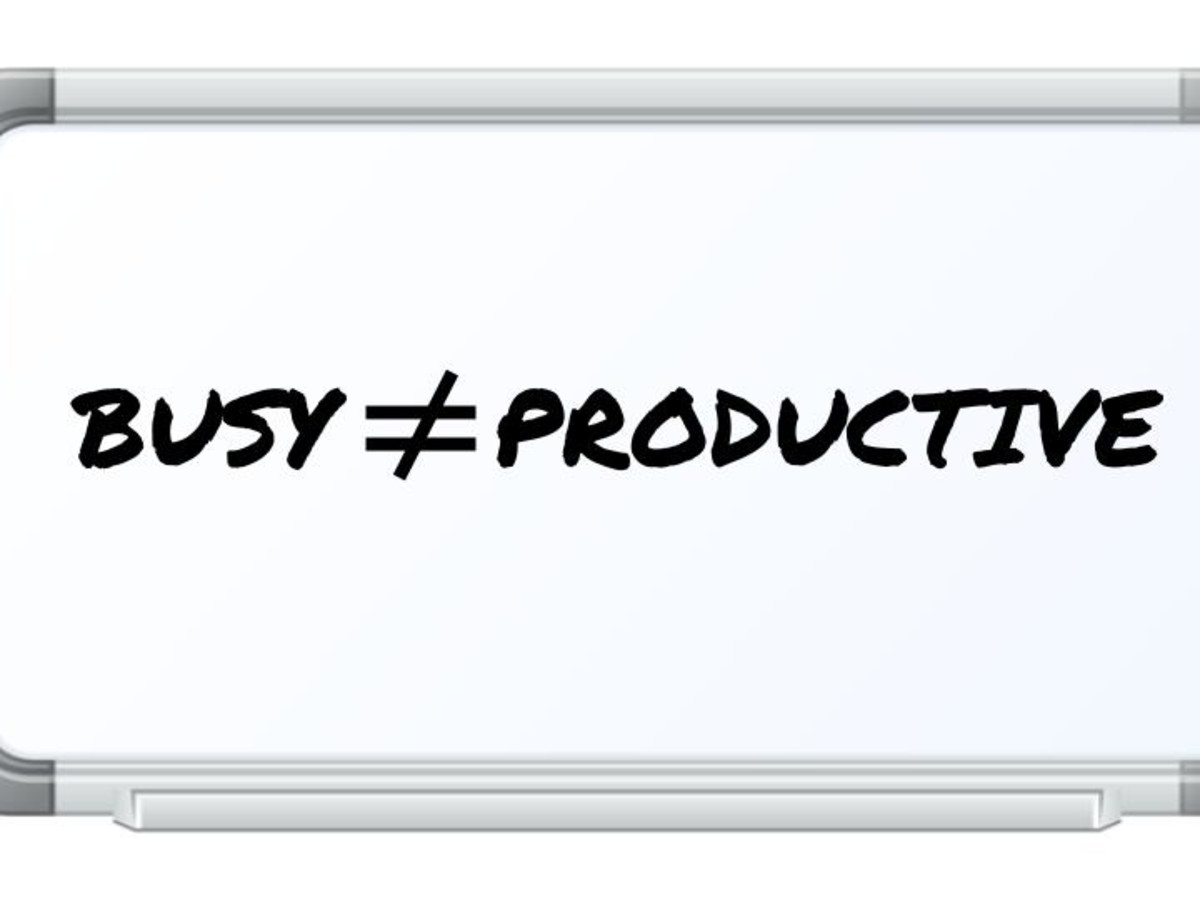
The Cult of Busyness and the Death of Productivity
Francesco Marcatto3 May 19
Whenever you ask someone how they are doing, a typical response might be “I’m busy, busy, busy”. This indeed is a strange answer. Why would ‘busy’ be considered an adequate response to a question about well-being? Moreover, why is it so important to be busy?
The current obsession with being busy at work, so common in most of the western world countries, is not easy to explain. On the contrary, most of the predictions about the future of work made during the last century were about a world where people, especially knowledge workers, would work less and enjoy their free time. For example, the British economist John Maynard Keynes predicted that by 2030 people would work “three-hour shifts or a fifteen-hour week”, and in a similar vein, the Nobel laureate Bertrand Russell postulated that a 4-hour workday should be enough work for everybody.
Sadly, the reality is very different. Many workplaces are worshipping the cult of busyness: workers are praised if they stay in office extra hours, reply to work email during the night or the weekend, don’t go on vacation or even on parental leave. It is like they are assigning status based on who works the longest hours and gets the least sleep instead of considering actual productivity.
The reasons behind the cult of busyness
Busyness as Status
A 2016 research paper called “Why Americans Are So Impressed by Busyness” tried to discover why we tend to assign a high status to busy people. The authors conclude that “that the shift from leisure-as-status to busyness-as-status may be linked to the development of knowledge-intensive economies. In such economies, individuals who possess the human capital characteristics that employers or clients value (e.g., competence and ambition) are expected to be in high demand and short supply on the job market.”
In other words, when we tell others that we are always busy, the implicit message is that we are sought after, and therefore we are important people. This is one of the main reasons for the “the busier you are, the more successful you seem” myth.
The Fear of Irrelevance
Sometimes appearing busy is also a strategic behavior when we want to avoid being seen as no more relevant, a dead branch which should be cut from the tree.
This is especially true for middle managers, a category with unclear roles which its actual relevance in modern businesses has long been debated. How do they show their importance to the company? By being busy, of course! If middle manager Tom is always busy doing something, then he must be a valuable asset for us and we can’t fire him, even if we don’t know exactly what he does and why.
Friendly advice: there are many insightful (and fun to read) articles about the busyness madness and middle managers in Ted Bauer’s blog The Context of Things, do yourself a favour and go read them (hint: start from this one).
Social Media and Busyness
With the introduction of Social Media, the importance of busyness is heightened.
The “second identity”, or the digital self, live in the realm of Social Media. This glamorized version of people only shows the absolute best versions we have to offer the world. Highly stylized, selectively chosen pictures are publicized for the world to see, in the hopes of gaining social currency. In other words, the subconscious purpose of the digital self is to increase perceived value from others.
The one thing we do see on other people’s social media accounts is just how “busy” they are. We see people traveling the world, eating at top-notch restaurants, working out… you name it. We advertise how busy we are to increase our own perception of importance and success.
The Fear of Boredom and Silence
Another reason why people are addicted to staying busy is that they are afraid of boredom. If busyness, within the cult mindset, equals importance or success, the opposite (rest) would mean that you are unsuccessful or lazy.
As we compare ourselves with our peers, this makes us feel bad. We try to compensate by finding more things to do, to not be perceived as lazy.
And yet another reason why people are addicted to staying busy is because of the silence that comes with not being busy. By silence, we are referring to distraction from external sources. This leaves the individual to become self-reflective, to consider “how they feel”, “what they are doing in life,” “their purpose” and so forth.
These are questions that scare many people because when they truly analyze their lives, they might realize that what they are doing is “not what they want”. It would mean that they are wasting opportunity and time.
From the Cult of Busyness to Actual Productivity
All of the above elements make up the cult of busyness. However, being busy doesn’t necessarily mean you are getting things done. Busyness does not equate productivity.
Productivity Comes from Purpose
Working on many tasks might not mean you’re working to goals. Having many things on your to-do list every day doesn’t mean that you are working towards something bigger. You might simply be filling up your schedule with things to keep you busy. To avoid feeling like you’re not a success, or to silence your inner dialogue.
Productivity can only be considered “productive” if the action leads to the completion of a goal or task. Everything else is simply distractors aimed at appearing busy. And this is the key difference between the truly successful, and the apparent successful.
Key Differences between “Busy People” and “Productive People”
-
Goals vs. Priorities. Busy people have many goals, while productive people have priorities. They have identified which goals are worth their time and focus only on the tasks that will get them closer to their objective.
-
Unbalanced Dedication vs. Balanced Life. Those who are exceptional at what they do have an unbalanced dedication to a craft/task. You don’t see Mark Zuckerberg hitting the gym six hours a day to buff up. He focuses his productive time on the one thing that is leading him towards his next goal. Busy people try to do everything. They go to the gym, take painting classes, do community service, etc. These are people that do not have focus and are trying to fill their schedules.
-
Busy People Say Yes to Everything, Productive People don’t. It doesn’t mean that you’ll simply say no to everything that doesn’t fit into “your plan”, but it does mean that you’ll carefully consider prior to saying “yes” to anything that comes your way. Busy people want to seem busy, so they say “yes” in order to reinforce social status. Productive people know that certain tasks will advance their cause, others won’t, and it’s totally okay to say no when it doesn’t provide any real benefit to you or your cause.
-
“Just in Time” vs “Smart Deadlines”. Busy people get things “just in time”. Productive people set deadlines to force action. Work always takes the full amount of time you allow it. This means that if you create (realistic) deadlines, you force yourself to work faster, harder and with more purpose.
There is also a nice infographic made by the people at MobileMonkey: Differences Between Busy People From Productive People
How to Be More Productive and Less Busy
Understanding that busyness doesn’t mean productivity, what can you and your organization do to become “more productive”. To do this, you need to embrace simplicity. For any given task, once you remove all the unnecessary steps, you usually are left with a simple approach to solving the problem.
In other words, it’s important to declutter your “To do” list. Productive people only have about 3-5 things on their daily “to do list”. Busy people have more than 20 items to check off.
Thus, it’s important to first establish your highest priority. Figure out, within any given period of time, which are the highest priority tasks in order. Starting with “most important” to “least important”.
Then see what you can completely eliminate from your to-do list. What are the things that simply are not important at all or could be outsourced to someone else?
Finally, ask yourself whether you are inventing things to seem busy. This relates to establishing priorities and will help you eliminate items from your list.
If you continue to implement these principles within your everyday decision-making, establish an actual goal, you can separate yourself from the cult of busyness, and join the cabal of productivity.
Hey, are you a Project Manager looking for a tool that will make you more productive? And you also want it to be powerful and easy? We developed the right tool for you: it’s called Mindiply Timeline and you can start a 30-day free trial here!







